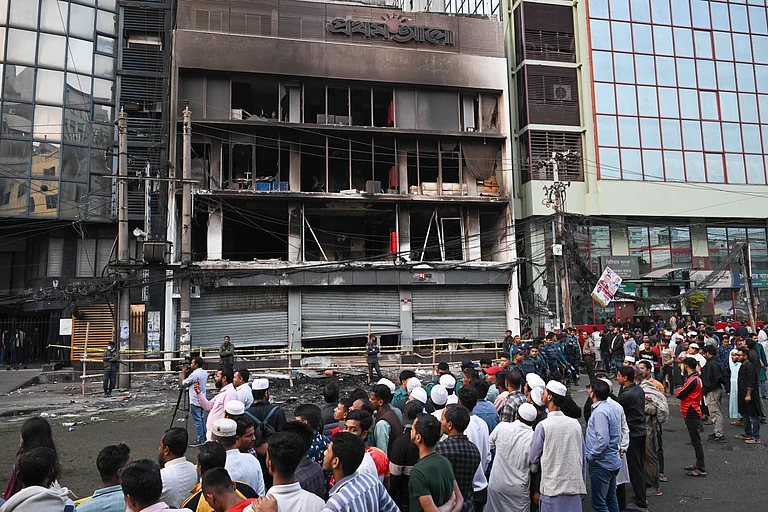The Foreign Affairs Adviser of Bangladesh's interim government, Md Touhid Hossain, said that ousted Prime Minister Sheikh Hasina's stay in India will not affect Dhaka's bilateral ties with New Delhi.
On whether Hasina's prolonged stay in India will affect the relations between the two, Hossain said, "This is a hypothetical question. If someone stays in the country why the relations with that particular country would be affected? There is no reason for that."
The 76-year-old Hasina resigned as the Bangladesh Prime Minister and fled the country last week, taking shelter in India for the time being. She is currently in a safe house in an unspecified location.
Hossain was of the opinion that bilateral relations are a relation of interest and friendship is also of interest. "Friendship does not exist if the interest is hurt," he added.
Both Dhaka and New Delhi have interests and they will follow those interests, Hossain said, adding that the relationship between the two nations is "not influenced by the presence of one individual in a country".
Hossain said that Bangladesh "will always try to maintain good relations" with India.
Earlier, the foreign affairs adviser had briefed the diplomats in Dhaka, including Pranay Verma, the Indian High Commissioner to Bangladesh, on the situation in the nation and sought their support.
"We believe that all our friends and partners in the international community would continue to stand by the interim government and our people as we embark on charting a new future for Bangladesh," he told the diplomats.
A career diplomat and former foreign secretary, Hossain maintained that Bangladesh was committed towards upholding all agreements made with other countries.
BRINK OF A NEW BEGINNING
The Foreign affairs adviser, meanwhile, also accused Sheikh Hasina-led Awami League regime of committing human rights violations in their bid to suppress a popular movement, ultimately leading to their ouster.
"However, the sheer power of people ultimately led to the fall of all authoritarian regimes," Hossain said, adding that the nation had experienced a "second liberation" last week during the mass uprising led by "our courageous students".
He said that the Muhammad Yunus-led interim government was committed to meeting the renewed expectations of the people, expressing confidence that the international community will support their government.
"Bangladesh is on the brink of a new beginning," Hossain said.
He told the diplomats that the interim government has taken swift measures to bring the law and order in control and bring back normalcy in the country.
Notably, the briefing was attended by representatives from all diplomatic missions in Dhaka, including the UN agencies. They also inquired about the security measures, Rohingya issue and the current situation.
"We can assure that the safety and security of the diplomatic and consular premises and persons will remain one of our core priorities," he added.
He said that the interim government's focus remains on ensuring a smooth transition to "inclusive and pluralistic electoral democracy as soon as possible ".
BRINGING HASINA HOME
During his first press briefing on Sunday, Hossain had said that the matter of possibly bringing Sheikh Hasina back home fell under the jurisdiction of the law ministry, adding that his office would respond only if that ministry makes any such request.
INTERIM GOVT'S POLICY
Md Touhid Hossain said that the interim government's policy is to maintain good relations with all countries while protecting Bangladesh's national interests.
"We intend to maintain smooth and positive relations with all... including India and China," Hossain said.
On the interim government's approach towards India, Hossain said that both sides share a strong and deep bond. But, he said, "It is imperative that people feel India is a good friend of Bangladesh...We want that, we want to advance (Dhaka-Delhi) relation towards that direction."
ALL RESIGNATIONS LEGAL
Interim government's head and Nobel laureate Muhammad Yunus said that the resignations of all the high-profile authorities close to former PM Sheikh Hasina are legal after protesting students issued ultimatums to officials in Hasina's government.
"Legally, all the steps were taken," the 83-year-old Yunus told reporters.
In the past few days, Bangladesh's chief justice, all five justices of the appellate division and the central bank governor have all resigned. This comes a result of weeks of protests of the students movement against the Awami League government.
Yunus, notably, said that one of the key priorities of the interim government is to restore the independence of the judiciary.
He termed the former Chief Justice Obaidul Hossain to be "just a hangman". Hossain is considered to be a loyalist to former PM Sheikh Hasina.
Meanwhile, Syed Refaat Ahmed was appointed as the new Chief Justice on Sunday after student leaders proposed his name for the post.
Students have vowed to cleanse the political system of Hasina's rule, which they have denounced as autocratic.
Yunus took over as the head of the interim government last week and had said that he was just helping achieve the students' dream. He had described the fall of Hasina's regime as the result of a "student-led revolution".
WHITE HOUSE DENIES INVOLVEMENT
The White House has strongly refuted allegations that the United States interferred in the internal affairs of Bangladesh, leading to the resignation and fleeing of former Prime Minister Sheikh Hasina.
“We have had no involvement at all. Any reports or rumours that the United States government was involved in these events is simply false. That is not true,” White House Press Secretary Karine Jean-Pierre told reporters during her daily conference.
"This is a choice for and by the Bangladeshi people. We believe that the Bangladeshi people should determine the future of the Bangladeshi govt. Any allegations as I have said and will continue to say, are not true," Jean-Pierre added.
YUNUS MEETS HINDU LEADERS
Amid tensions over several Hindu temples and establishments being vandalised, Muhammad Yunus met with the Hindu Bengali leaders in the nation at the Dhakeshwari Temple on Tuesday.
He urged people to "exercise patience" before judging the role of his interim government.
Yunus said that everyone's rights should be ensured and blamed "institutional decay" for the predicament that his country has fallen into.
“Rights are equal for everyone. We are all one people with one right. Do not make any distinctions among us. Please, assist us. Exercise patience, and later judge -- what we were able to do and not. If we fail, then criticise us,” the Nobel laureate was quoted as saying by The Daily Star newspaper.
“In our democratic aspirations, we should not be seen as Muslims, Hindus, or Buddhists, but as human beings. Our rights should be ensured. The root of all problems lies in the decay of institutional arrangements. That is why such issues arise. Institutional arrangements need to be fixed,” Yunus added.
The Yunus-led interim government has vowed to punish vandals who defaced temples belonging to the nation's minorities and carried out arson attacks, loots on their properties.
The 83-year-old Nobel laureate had condemned the attacks, calling them "heinous". He had said that no can can harm them, "they are my brothers, we fought together and we will stay together".









.jpg?auto=format%2Ccompress&fit=max&format=webp&w=768&dpr=1.0)

















